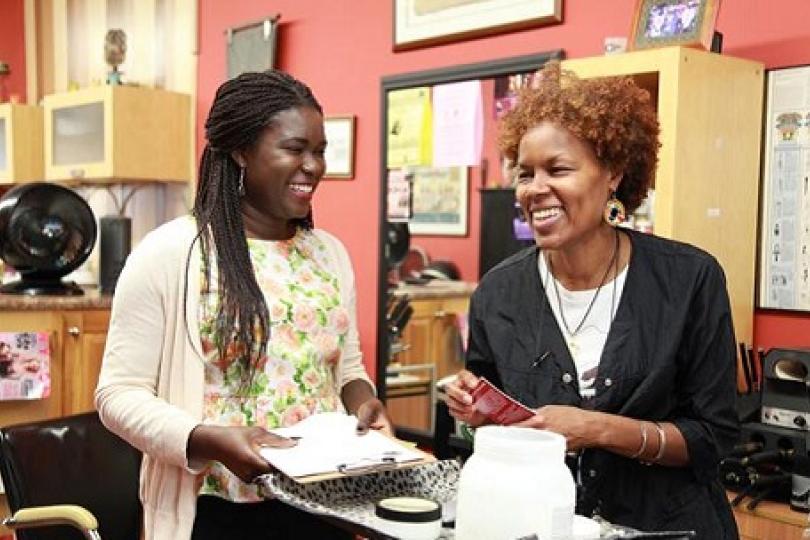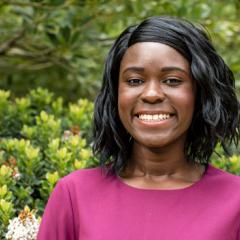The Scientist Who Found Her Voice by Listening to Workers
Editor's note: This profile of Switzer Fellow Teniope Adewumi-Gunn was written by Nicole Greenfield and originally published by NRDC.org.
When Teniope Adewumi-Gunn was growing up, she remembers feeling like she had three career options: lawyer, doctor, or engineer. “You pick one of those paths and you realize the American dream,” she says, noting that it’s a familiar expectation among many children of immigrants. Adewumi-Gunn, who left Nigeria in elementary school and eventually settled with her parents and sister in the Southern California suburb of Corona, obliged. But partway through her premed program at California State University, San Bernardino, she began shifting her focus from the patients to the practitioners around her.
It wasn’t just that she didn’t like blood. Adewumi-Gunn also became intrigued by the subject of occupational health and safety, which she began to explore after switching gears to study environmental health sciences.
“It was the first time I had ever really been taught that what you do at work impacts your health,” she says. “It resonated with me. My mom's a nurse, she works long hours, she’s always on her feet—and I would see how that took a toll on her. The idea that there were people whose job it was to take care of those people was fascinating to me.”
Adewumi-Gunn—who would eventually join NRDC, where she focuses on the intersection of climate change and worker health—set out to chart a new path as an industrial hygienist, a profession that encompasses scientists and engineers trained to recognize and address on-the-job health and safety hazards, from poor air quality to lead exposure to direct contact with disease or hazardous agents. Along the way, she made another critical course-shifting decision during her master's program at UCLA, opting to seize an opportunity to work with a community-based organization through the university’s occupational health internship program.
In 2014, Adewumi-Gunn was paired with Black Women for Wellness (BWW), a nonprofit in South Los Angeles that focuses on the health and well-being of Black women and girls. As part of the internship, she interviewed Black salon workers, who are disproportionately impacted by health-harming chemicals lurking in the hair products they use on clients and themselves, often with no ventilation. She listened to their experiences—from coping with eye and skin irritations to suffering from breathing problems to navigating decisions around wearing personal protective equipment, a choice that could alarm clients—and shared her scientific knowledge of the products’ safety. Many contained endocrine-disrupting chemicals like parabens and phthalates—chemicals that tend to occur in higher levels in Black women’s bodies versus white women’s bodies. About 9 percent of the women Adewumi-Gunn and her BWW colleagues surveyed reported issues related to reproductive health.
The research resulted in a widely shared report that showed how Black women’s hair products are among the most toxic on the market, containing chemicals linked to more than 100 health issues, ranging from headaches to respiratory problems to chemical burns. Adewumi-Gunn also published her first peer-reviewed journal article on the topic.
That experience was powerful and rewarding: As a Black woman who grew up spending hours at a time at similar salons, Adewumi-Gunn felt a connection to the workers and their clients. At the salon, a place filled with laughter and the comfort of a family member’s living room, Adewumi-Gunn learned about building a business, about community, and about giving. “Working on salon safety was a way to give back to a community that is so beneficial to many Black people,” she says. “They deserved stronger protections and oversight on the products they were using and the right to know what was in them to make informed decisions.”
As she spent more time with the women in salons, she began to delve into policy advocacy. While finishing her doctorate degree, she took on the oversight of BWW’s environmental justice work, which included collaboration with scientists from environmental organizations across the country (including future NRDC colleagues). Eventually, this advocacy led to the passage of a bill in California aimed at protecting workers by requiring manufacturers to list ingredients on the labels of professional salon products.
“Teni was able to talk to the community, talk to researchers and scientists, and talk to politicians, and be equally comfortable in all of those spaces. That is a special gift,” says Nourbese Flint, executive director of the Black Women for Wellness Action Project, who worked closely with Adewumi-Gunn during her time at BWW.
Dr. Kevin Riley, one of Adewumi-Gunn’s mentors at UCLA, also highlights her deep commitment to scientific integrity while simultaneously working to meet community needs. “She was able to marry that technical hygiene training with staying grounded on the day-to-day realities and concerns of the community,” he says, noting that she served as an important bridge by finding ways to communicate technical and scientific language in a way that people could understand and respond to.
These days, at NRDC, she’s focused on the climate hazards that workers face, especially extreme heat, and developing ways to support them, including through state and federal safety standards. Extreme heat is a particularly pressing issue, Adewumi-Gunn notes, because it impacts so many—everyone from farmworkers to postal workers and electricians to teachers, particularly among BIPOC and immigrant communities. As highlighted in a June 2020 NRDC report, On the Front Lines: Climate Change Threatens the Health of America’s Workers, conservative estimates hold that heat killed more than 780 workers in the United States between 1992 to 2016 and sickened or injured nearly 70,000 others. The wide range of conditions they suffered included heat stroke and heart attack.
At the same time, Adewumi-Gunn notes that these impacts are highly preventable. “It’s something we can solve pretty quickly if we have the right policies in place, and if we have employers, advocates, and policymakers listening to workers,” she says. Most immediately, a federal, enforceable heat-safety standard is essential. Critically, and more generally, supporting workers’ rights to unionize and bargain collectively could help gain significant on-the-job protections, a topic Adewumi-Gunn feels passionate about as the daughter of a nurse in a union.
For her part, Adewumi-Gunn has provided technical expertise on heat standards for workers in Oregon, shared recommendations with representatives at the Occupational Safety and Health Administration (OSHA) on strengthening its heat stress campaign documents, and presented on heat safety to academics, government officials, and worker advocates throughout the western United States. Adewumi-Gunn also represents NRDC, along with senior advocate Juanita Constible, in the Heat Stress Network, a coalition focused on passing federal and state occupational heat stress legislation.
As she approaches her one-year anniversary at NRDC this August, Adewumi-Gunn has been listening to the experiences of workers impacted by heat in California, including those who spend their days in warehouses and car washes, for example, or who toil as day laborers. She communicates closely and frequently with other advocates, researchers, and worker centers to inform her research as well as any collective decision-making processes.
“One of the biggest things I've learned through all of my work is that you don't actually know what's going on until you ask the people who are being impacted or the folks on the ground,” she says. “You can come in with your preconceived notions, but if you don't actually have those conversations with folks, you don't get the nuances.”
As one of few Black women in her specialty in the environmental space, Adewumi-Gunn is proud to be in a place where she can knit together her academic background and her passion for community care. “For a long time, I thought that being a scientist and an industrial hygienist, which is very technical, meant I couldn't be an advocate. That it meant I couldn’t have a voice,” she says. “But you can’t just have the science. You can’t just have the community work. And you can’t just have the policy work. Nothing we do is in a silo. It has to all be interwoven to make some change.”

